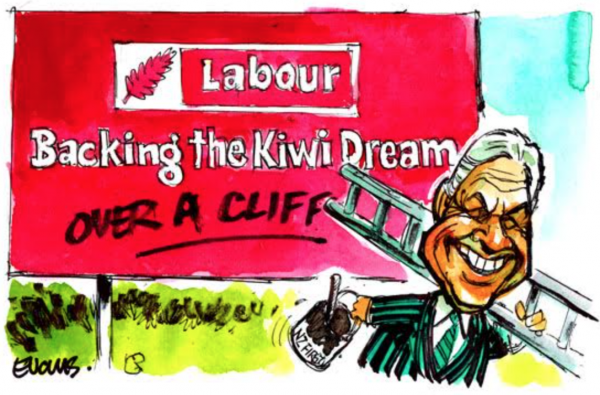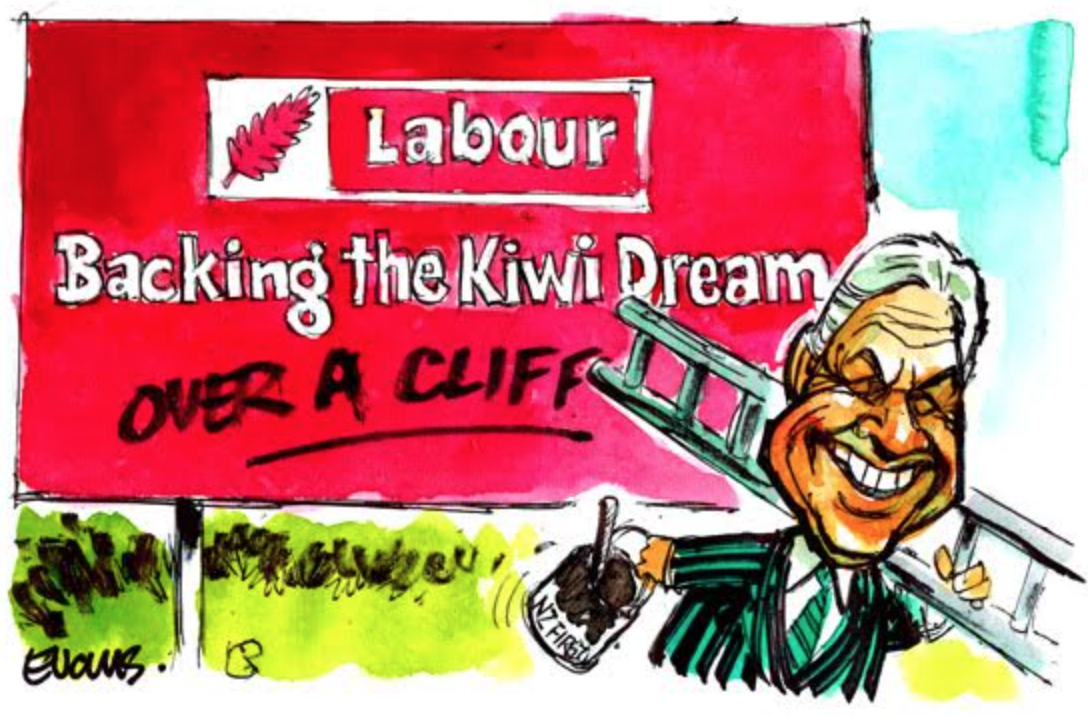
As we head into this year’s election NZ First has dangled the carrot of a binding referendum on whether the Māori seats should be abolished. Given it has been NZ First policy to abolish the seven Māori electorates for some time the position taken just over two months out from an election is not surprising.
What does not make sense though is the conflict between Winston Peters’ position on parliamentary sovereignty and representative government and his dependence on referenda as the basis for his decision making.
Winston Peters has always been clear that he supports the Westminster form of government and has been disparaging of any proposal that looks to incorporate recognition of the Treaty of Waitangi as a foundation stone or any system that addresses and recognises the status of Māori as New Zealand’s indigenous people.
In essence, this carrot is being dangled to appeal to a majority population in the hope that those who follow the fortunes of Hobson’s Pledge Trust, One NZ Foundation and 1Law4All will tick the NZ First box.
While Māori seats in Parliament were created to limit the influence of Māori male voters, today they exist because there is a need to ensure that the damage done to Māori since the establishment of that Westminster system has a vehicle that recognises our status as Māori. There is no other recognition available in our electoral system and Winston Peters is clearly not interested in any alternative.
Abolishing Māori electorates might meet Winston Peters’ desire to reduce the number of Māori in Parliament but the reality is that it will fundamentally change how Māori voters are represented in Parliament. Māori who are elected in general seats or from a Party list do not have the mandate to speak for Māori in the same way as those elected to represent Māori electorates can. Because Māori are the majority in Māori electorates and are the minority in general electorates, the Māori seats at least provide a means to protect Māori minority interests.
And, as the 1986 Royal Commission on the Electoral System Report stated, referenda are “blunt and crude devices … that blur the lines of accountability and responsibility of Governments and political parties”. Reverting to referendum acknowledges that Parliament is not always sovereign. Referenda do not strengthen trust in democracy. The Brexit referendum is a good example of why Government by opinion polls is not positive. The result of Brexit – a major issue for Britain – meant that Britain’s place in Europe was messier not clearer. It pushed the nations and communities of Britain apart. It did not bring them together. And the repercussions continue.
Our sovereignty and that of Parliament is fundamental to our system of government and referenda are no substitute for the deliberative processes we have within the existing framework of our representative democracy.
And in the case of Māori seats, Winston Peters is choosing to use a tool that advantages the majority against a minority. There is no question that Māori have a significantly smaller voting bloc and that the majority population are unaffected by the proposal to abolish Māori seats and may see no reason to retain them. And yet that majority is likely to have the numbers to support this NZ First policy. Perhaps we haven’t yet seen the full detail of this proposal and Winston Peters intends that the referendum will be decided only by the 469,027 Maori enrolled voters – 55% of whom are on the Māori roll. It is Labour’s position that the Māori Electoral Option held every 5 years provides the proper process for Māori to determine when the time is right for the abolition of Māori electorate seats.
But we know that does meet the 2017 political strategy for NZ First. This announcement is about a political advantage for NZ First from their new found allies at the expense of Māori. A deliberate ploy to drive a wedge between the majority and Māori and undermine our position as tangata whenua. Using a referendum to execute a policy that seeks to abolish the only means of protecting Māori interests would remove the only system that protects Māori as the indigenous people from the devastating impact of majority politics that has been the experience of Māori since the Westminster system began.






[Commented deleted. Still suspended. – Scarletmod]
Kia ora Andrew. I’m not sure what history you base your comment on but the fact is that the 1852 Constitution Act limited Maori voters to those that had individual title granted by the Crown. Given communal ownership the numbers of Maori who qualified were very small. The 1867 Act originally favoured Maori who had fought with the Crown and introduced 4 Maori electorates. The proposal was supposed to be for 5 years only as it was expected that Maori title would be individualized by that time – facilitating Maori land loss! It was not about a Maori voice but given population numbers 4 seats for Maori was significant underrepresentation – 1 seat for every 12,500 Maori and with 72 seats for Pakeha there was 1 seat for every 3,500 Pakeha. The number of Pakeha electorates rose with population increases, rising to 95 in 1993, while Maori electorates remained at 4 until a 5th seat was created in 1996. Different processes for Maori electorates occurred until 1975 when Labour introduced the Maori electoral option allowing Maori to choose whether they wanted to be on the Maori or General roll and adjusting numbers of seat by population (as with General seats). In 1976 National fixed the number at 4 and we now have the electoral option under MMP that will determine the number of Maori seats by those electing to be on the Maori roll. The Maori seats will be relevant as long as Maori see them as representative of them as the indigenous people who can be outvoted by a majority. There is no justification for the non-Maori majority to determine the relevancy of Maori seats. And comments about apartheid are irrelevant and ignore the reality of the status of Maori as tangata whenua and the ability to impose a parliamentary system by virtue of the Crown entering into the Treaty of Waitangi with Maori. And saving the Maori seats is the only sure way that Maori representation can continue.
Te Tiriti is a fraud, and Winston a mischiefmaker.
Whites are taught to see themselves as individuals, rather than as part of a racial group. Individualism enables us to deny that racism is structured into the fabric of society. This erases our history and hides the way in which wealth has accumulated over generations and benefits us, as a group, today. It also allows us to distance ourselves from the history and actions of our group. Thus we get very irate when we are “accused” of racism, because as individuals, we are “different” from other white people and expect to be seen as such; we find intolerable any suggestion that our behavior or perspectives are typical of our group as a whole.
New Zealanders are simply unable to solve their racial and cultural issues and challenges, as they are totally divided, not one nation.
what it means to be white in a society that proclaims race meaningless, yet is deeply divided by race. This is what I have learned: Any white person living in NZ will develop opinions about race simply by swimming in the water of our culture. But mainstream sources—schools, textbooks, media—don’t provide us with the multiple perspectives we need.
Yes, we will develop strong emotionally laden opinions, but they will not be informed opinions. Our socialization renders us racially illiterate. When you add a lack of humility to that illiteracy (because we don’t know what we don’t know), you get the break-down we so often see when trying to engage white people in meaningful conversations about race.
While individual whites may be against racism, they still benefit from the distribution of resources controlled by their group. Yes, an individual person of color can sit at the tables of power, but the overwhelming majority of decision-makers will be white. Yes, white people can have problems and face barriers, but systematic racism won’t be one of them. This distinction—between individual prejudice and a system of unequal institutionalized racial power—is fundamental. One cannot understand how racism functions in NZ today if one ignores group power relations.
Anyway it is worth having the discussion, we are not even mature enough as a Nation to have an intelligent conversation about Immigration.
Winston brings up the subject of Immigration and the former squash player and Race Relations Councilliator starts accusing him of Racism ?
We are still a very immature, insular and reactionary type society who does not know where it stands in the Modern World and does not have a vision of where it wants to go in the future ?
A nationawide poll on the Maori seats would be a clear example of the tyranny of the majority suppressing the needs of a minority.
If this goes through, what other minority rights can be abolished by “majority” vote?
This is a red line in the sand.
Probably better to have just people of Maori ethnicity or bloodlines to vote in the Referendum otherwise the white majority will definitely vote to abolish the Maori Electorate Seats.
Comments are closed.